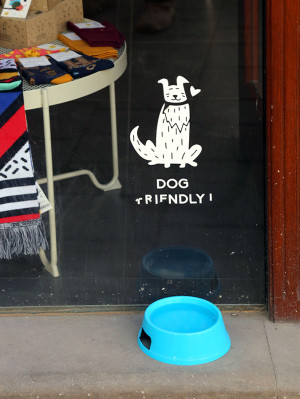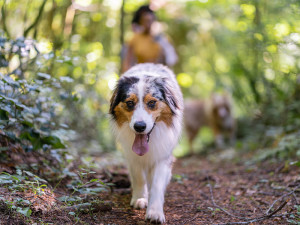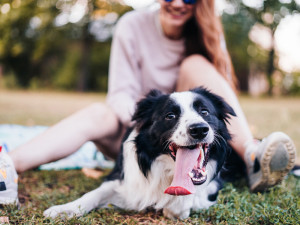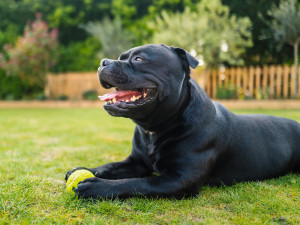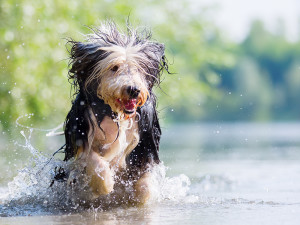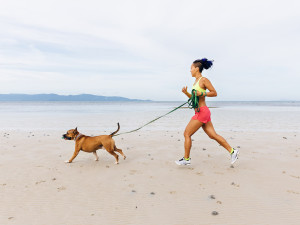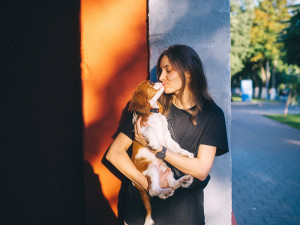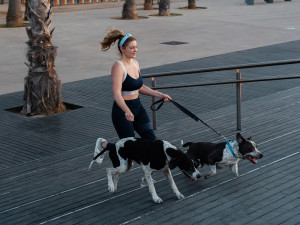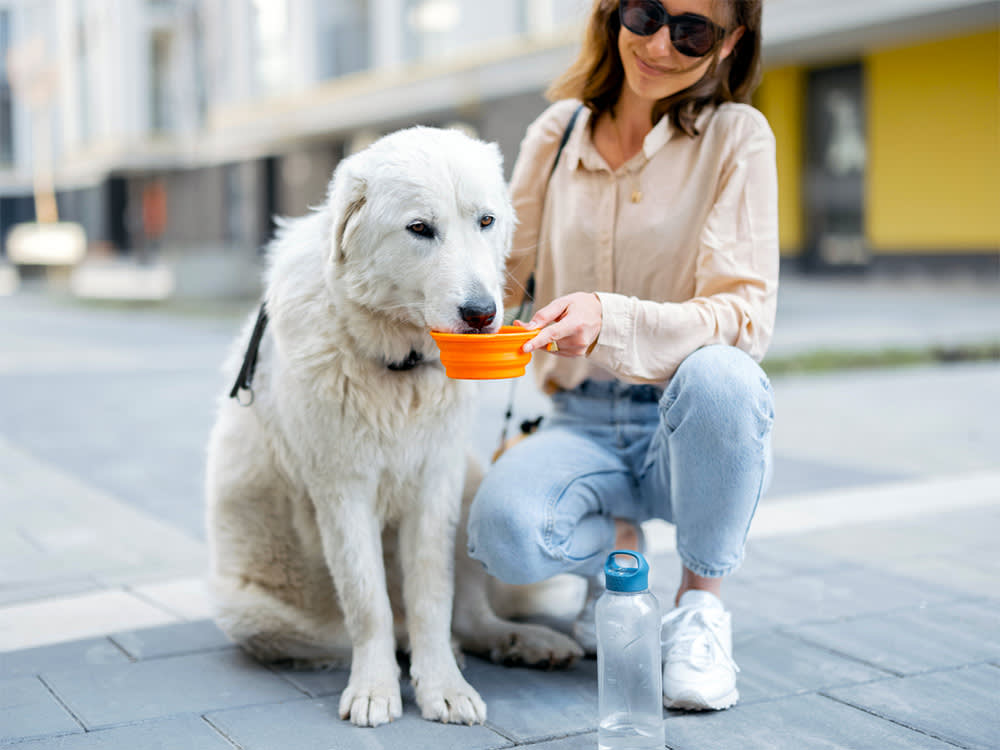
share article

Your pet wants you to read our newsletter. (Then give them a treat.)
In This Article:
Average Dog Water Consumptionopens in a new tab Normal Reasons for Increased Drinkingopens in a new tab When to Be Concerned About Excessive Drinkingopens in a new tab When to See a Vetopens in a new tab How to Manage Water Intake at Homeopens in a new tab Frequently Asked Questionsopens in a new tab
Your dog is probably oblivious to the latest fashion craze: coveting the perfect water bottle to match their outfit. So, what’s their excuse? Why does your dog drink so much water? Most of the time, dogs are motivated to drink by thirst cues and they are drinking water to maintain their hydration. The amount they need to drink in order to stay hydrated will vary based on many daily factors including how active they are, how hot the weather is, and how salty their diet is.
Other factors can also influence how much they drink including certain behavioral factors and medical problems. Drinking more water on occasion is not usually cause for concern. Medical problems that tend to make dogs drink more water are usually more chronic, meaning they will drink more water all the time, not just one day. These conditions are also usually accompanied by other medical and behavioral changes. Read on to learn all about dogs and their water consumption.
Average water consumption in dogs
All this talk about drinking water may have you wondering how much water a dog should drink in a day. The answer is that it depends. Just like for people, water consumption will change based on many factors. As a general rule, dogs typically drink between 60 to 80 milliliters of water per kilogram of body weight per day. To simplify the math, a 10-pound dog would typically drink about one cup of water to about one and a half cups of water per day while a 50-pound dog could drink between four and half to seven and a half cups a day. Keep in mind, calculating your dog’s actual water intake per day is not as easy as it sounds.
This number includes all the water they consume, including water from food, like juicy bites of fruitsopens in a new tab or canned dog food, plus any sneaky slurps of toilet water or puddles, too. If you have more than one dog in the home, it can be especially challenging to know how much water each dog drinks, so try not to obsess about each milliliter of water they do or do not drink. The first step for a curious pet parent is to observe general trends, such as whether there is a sudden change in how much water their dog is drinking.
True signs of a problem will also affect how much a dog pees, so if you think your dog is drinking a lot more or less, try to take note of their urination. Are they urinating a lot more or less? Does their urine look very dark yellow, or very clear and dilute? Are they suddenly having accidents in the house? All of these clues can help you figure out if there is any cause for concern or if this is just normal dog stuff.
Normal reasons for increased drinking in dogs
There are lots of reasons for a dog’s water consumption to vary so if your dog is drinking more water than usual, consider some of the following possibilities:
1. Physical activity
While dogs do not sweat like we do, they pant to keep cool opens in a new tabthrough the evaporation of water from their respiratory tract. Just like us, they lose fluids as they work to keep cool. This is more pronounced with intense exercise, long play sessions, and in hot weather. Under these conditions, they will need to drink a lot more water to replace what it lost.
2. Environmental factors
Hot weather and dry climates can also stimulate dogs to drink moreopens in a new tab. As they pant to keep cool, they are losing water and will need to replace those fluids.
3. Behavioral factors
Dogs sometimes pant for other reasons, such as when they feel nervous, excited, stressed, or afraid. This kind of panting still results in water loss, stimulating them to drink more to replace those losses. You may notice this after a long car rideopens in a new tab, a trip to the vet, or other situations where your dog is panting heavily.
4. Dietary changes
Increased salt consumption or decreased water content in your dog’s food can prompt them to drink more water. This can happen after eating salty snacks — including some jerky-style dog treats and salty table snacks — as well as certain prescription dog food diets that are intended to dilute their urine. Switching them from a canned-food diet to dry kibble will also increase their drinking because they will be getting less water from their food.
5. Medications
Certain medications can also cause dogs to drink more water. Some of the common medications that have this effect include steroids like prednisone, thyroid medication, certain anti-seizure medications, and diuretics, like furosemide used in the treatment of heart disease.
6. Age
Young puppies under four months old are not able to concentrate their urine as well as adult dogs. They tend to urinate more, have more dilute urine, and as a result, may drink more to replace the fluids lost in their urine.
When to be concerned about your dog’s increased drinking
If you think your dog is drinking an excessive amount of water, and it’s not just a one-time observation but an ongoing trend, it’s always a good idea to consult your veterinarian. If there is a medical reason for their increased thirst, it will usually be accompanied by other health changes too such as fatigue, increased urination, changes in appetite, vomiting, diarrhea, weight loss, or weakness. It’s important to mention any other changes you notice to your vet so they can help you get to the bottom of their signs. Some common conditions associated with increased drinking include:
1. Dehydration
If your dog becomes dehydrated such as after being sick with vomitingopens in a new tab, diarrheaopens in a new tab, or a fever, they may drink more water to compensate for fluids lost from their illness. If they are not eating because of their illness, they are especially at risk for dehydration and should be evaluated by a vet right away.
2. Diabetes
Diabetic dogsopens in a new tab often drink more water and urinate large amounts of dilute pale urine. They may also have an increased appetite but lose weight despite eating more. Diabetes can be diagnosed easily by your veterinarian on routine blood and urine tests.
3. Kidney disease
The kidneys are responsible for concentrating the urine and reabsorbing water. A dog with kidney diseaseopens in a new tab may have a decreased ability to concentrate the urine, resulting in increased urination with very dilute urine. As a result, they need to drink more water to replace what is lost in their urine.
4. Hormonal changes
Certain diseases that affect hormone levels in the body can also cause dogs to drink more water and urinate more. Some common conditions we see in dogs include Cushing’s diseaseopens in a new tab, an overproduction of cortisol, and pyometra, an infection of the uterus.
5. Other health problems
There are many other conditions that can also cause an increase in drinking, which is why getting a thorough work-up with your dog’s veterinarian is so important. Some of these other causes include certain toxinsopens in a new tab, excessive drooling, urinary problemsopens in a new tab, and some tumors.
When to see your dog’s vet about excessive drinking
If you notice your dog drinking excessively on the regular, or it seems like your dog is progressively drinking more and more water over time, see your vet. Be especially proactive if they have other changes in their behavior or health, such as acting lethargic, not eatingopens in a new tab, vomiting, diarrhea, weight loss, or weakness.
For many of the conditions that cause increased thirst, early treatment is very important for getting their signs under control and preventing more serious complications. Your vet will likely recommend a work-up that includes bloodwork and a urinalysis to determine what’s going on.
How to manage your dog’s water intake at home
Your dog should always have access to clean drinking water so they can manage their water intake based on their needs and thirst cues. This is especially important in the heat, after exercise, and if they have an existing medical condition or take medications that may make them extra thirsty.
Depriving them of water can lead to life-threatening dehydration. If you are concerned about behavioral issues like urinating in the houseopens in a new tab, or are working on house training a puppyopens in a new tab, speak with a certified behaviorist on training techniques that can help you and your pup be successful without depriving them of water. This may include more frequent walks to help prevent accidents and/or blocking off certain areas of the house to prevent damage to furniture or rugs. Just like us, a dog’s thirst varies throughout the day and from one day to the next, so it is important that they can access their water whenever they need to.
FAQs (People also ask):
What is water intoxication in dogs?
Water intoxicationopens in a new tab is a very rare condition in which a dog drinks an excessive amount of water, leading to dangerously low levels of critical electrolytes like sodium. This tends to happen when dogs unintentionally ingest a lot of water, such as when playing fetch in a pool or lake. Most dogs will naturally stop drinking way before this point if they are drinking due to thirst.
Do dogs drink a lot of water before they die?
Not typically, however, dogs with certain health problems like kidney disease may have an increased urge to drink, especially in the final stages of their disease. Many times if a dog is very sick, they will not eat or drink at all at the end of their life.
How can I get my dog to drink more water?
Most dogs do not need to be coaxed to drink more; they will listen to their body and drink when necessary. If you want to help your dog drink more on hot days, try offering foods with extra water such as canned dog food or fruits that are extra juicy. You can also try adding a few ice cubes to their water, or a small amount of broth to entice them to drink.
References:
Frontiers in Veterinary Science: Total Water Intake and Urine Measures of Hydration in Adult Dogs Drinking Tap Water or a Nutrient-Enriched Wateropens in a new tab
Merck Veterinary Manual: Cushing’s Syndromeopens in a new tabMorris Animal Foundation: Chronic Kidney Disease in Dogs and Catsopens in a new tab

Dr. Amy Fox, DVM
Amy Fox, DVM is a small animal veterinarian in New York City. A lifelong animal lover, Dr. Fox studied biology in college and then worked as a veterinary nurse before pursuing veterinary school at Cornell University. She has worked in many different settings including shelter medicine, emergency medicine, general practice, and animal cruelty and forensics. She is especially interested in nutrition, preventative medicine and care for senior pets. Dr. Fox also enjoys writing about veterinary medicine and teaching. In her free time she loves to cook, garden, and go for long runs.
Related articles
![Bearded Collie running in a lake]() opens in a new tab
opens in a new tabWhen Drinking Too Much Water Is Deadly
How to keep your swim fan safe.
![Black lab swimming in pool]() opens in a new tab
opens in a new tabSwimming Dogs: Water Hazard and Safety Tips
Keep your pup safe in the pool, a pond or the ocean.
![Shepherd dog playing with yellow ball at the beach]() opens in a new tab
opens in a new tabHow to Keep Your Dog Safe At the Beach
5 tips to help your pup have fun in the sun — safely.
- opens in a new tab
Can You Overexercise Your Dog?
There’s such a thing as too much of a good thing.
![Woman holding a beagle in warm dappled summer light]() opens in a new tab
opens in a new tabYou’ve Got a Summer-Lovin’ Pup. Here’s How to Keep Them Safe
Some like it hot (but not most dogs). Here are the season’s health hazards, from fleas to foxtails.
![Woman in athletic clothing jogging up stairs in a tropical city with her two dogs on leashes running with her]() opens in a new tab
opens in a new tabRunning With Your Dog Is Possible — It Doesn’t Just Happen in Photoshoots
You — yes you! — can be one of those fun people who runs with your dog. Just be smart about it.
